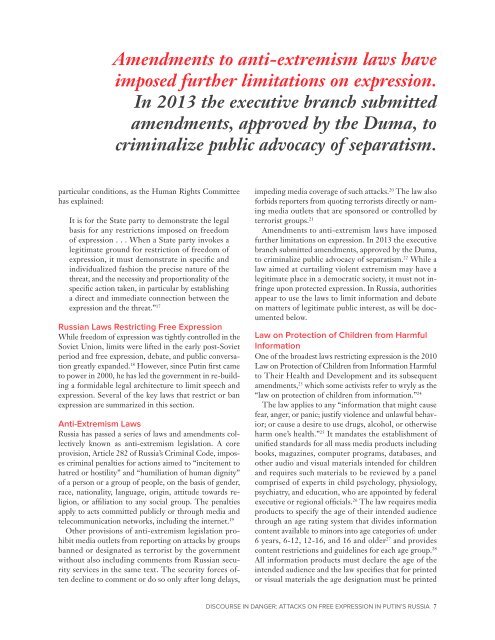DISCOURSE IN DANGER
2poGcgOv3
2poGcgOv3
You also want an ePaper? Increase the reach of your titles
YUMPU automatically turns print PDFs into web optimized ePapers that Google loves.
Amendments to anti-extremism laws have<br />
imposed further limitations on expression.<br />
In 2013 the executive branch submitted<br />
amendments, approved by the Duma, to<br />
criminalize public advocacy of separatism.<br />
particular conditions, as the Human Rights Committee<br />
has explained:<br />
It is for the State party to demonstrate the legal<br />
basis for any restrictions imposed on freedom<br />
of expression . . . When a State party invokes a<br />
legitimate ground for restriction of freedom of<br />
expression, it must demonstrate in specific and<br />
individualized fashion the precise nature of the<br />
threat, and the necessity and proportionality of the<br />
specific action taken, in particular by establishing<br />
a direct and immediate connection between the<br />
expression and the threat.” 17<br />
Russian Laws Restricting Free Expression<br />
While freedom of expression was tightly controlled in the<br />
Soviet Union, limits were lifted in the early post-Soviet<br />
period and free expression, debate, and public conversation<br />
greatly expanded. 18 However, since Putin first came<br />
to power in 2000, he has led the government in re-building<br />
a formidable legal architecture to limit speech and<br />
expression. Several of the key laws that restrict or ban<br />
expression are summarized in this section.<br />
Anti-Extremism Laws<br />
Russia has passed a series of laws and amendments collectively<br />
known as anti-extremism legislation. A core<br />
provision, Article 282 of Russia’s Criminal Code, imposes<br />
criminal penalties for actions aimed to “incitement to<br />
hatred or hostility” and “humiliation of human dignity”<br />
of a person or a group of people, on the basis of gender,<br />
race, nationality, language, origin, attitude towards religion,<br />
or affiliation to any social group. The penalties<br />
apply to acts committed publicly or through media and<br />
telecommunication networks, including the internet. 19<br />
Other provisions of anti-extremism legislation prohibit<br />
media outlets from reporting on attacks by groups<br />
banned or designated as terrorist by the government<br />
without also including comments from Russian security<br />
services in the same text. The security forces often<br />
decline to comment or do so only after long delays,<br />
impeding media coverage of such attacks. 20 The law also<br />
forbids reporters from quoting terrorists directly or naming<br />
media outlets that are sponsored or controlled by<br />
terrorist groups. 21<br />
Amendments to anti-extremism laws have imposed<br />
further limitations on expression. In 2013 the executive<br />
branch submitted amendments, approved by the Duma,<br />
to criminalize public advocacy of separatism. 22 While a<br />
law aimed at curtailing violent extremism may have a<br />
legitimate place in a democratic society, it must not infringe<br />
upon protected expression. In Russia, authorities<br />
appear to use the laws to limit information and debate<br />
on matters of legitimate public interest, as will be documented<br />
below.<br />
Law on Protection of Children from Harmful<br />
Information<br />
One of the broadest laws restricting expression is the 2010<br />
Law on Protection of Children from Information Harmful<br />
to Their Health and Development and its subsequent<br />
amendments, 23 which some activists refer to wryly as the<br />
“law on protection of children from information.” 24<br />
The law applies to any “information that might cause<br />
fear, anger, or panic; justify violence and unlawful behavior;<br />
or cause a desire to use drugs, alcohol, or otherwise<br />
harm one’s health.” 25 It mandates the establishment of<br />
unified standards for all mass media products including<br />
books, magazines, computer programs, databases, and<br />
other audio and visual materials intended for children<br />
and requires such materials to be reviewed by a panel<br />
comprised of experts in child psychology, physiology,<br />
psychiatry, and education, who are appointed by federal<br />
executive or regional officials. 26 The law requires media<br />
products to specify the age of their intended audience<br />
through an age rating system that divides information<br />
content available to minors into age categories of: under<br />
6 years, 6-12, 12-16, and 16 and older 27 and provides<br />
content restrictions and guidelines for each age group. 28<br />
All information products must declare the age of the<br />
intended audience and the law specifies that for printed<br />
or visual materials the age designation must be printed<br />
<strong>DISCOURSE</strong> <strong>IN</strong> <strong>DANGER</strong>: ATTACKS ON FREE EXPRESSION <strong>IN</strong> PUT<strong>IN</strong>’S RUSSIA 7


